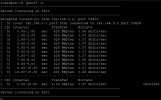Hallo an alle Netzwerk und Proxmox Experten, folgendes ist passiert:
Ich habe meinen Proxmox Home Server ein stromsparendes Upgrade gegönnt.
Nachdem ich diesen zusammengebaut hatte, die Mellanox Connect X2 Single Port Karte (Server) wieder mit meinem Hauptsystem Debian 11 Bullseye über ein SFP+ DAC Kabel ordnungsgemäß miteinander verbunden habe, zeigt er mir beim ersten Test mit iperf3 zwischen beiden 10,9 an, aktuell leider nur noch 3,7. Intern von VM zu Proxmox passt alles, aber das Hauptproblem besteht zwischen den beiden Systemen, die direkt ohne Switch verbunden sind. MTU habe ich auf beiden Systemen Jumbo Frames eingestellt entspricht 9000 An welcher Einstellung kann es liegen ?
Freue mich über hilfreiche Vorschläge
Systemkomponenten Server:
CPU = Intel i3 6100
RAM = Kingston Fury DDR 4 8GB
MB = Gigabyte Q170M - D3H
System = Proxmox 7.2-7
Netzteil = Compat Power 550W
HDD = 2x 1TB NAS Platten
SSD: 2x Crucial MX 500GB und 1x Emtec X 150 120GB
Netzwerk: Mellanox Connect X2
Intel Gigabit LAN
Debian 11.3 (Bullseye) Desktop Rechner keine VM!
CPU = Intel i5 7400
RAM = Kingston Fury DDR4 8GB
MB: = Asus Prime B250
Netzteil = Cooler Master 550W
GPU: Nvidia GTX 660ti
Netzwerk = Intel Gigabit Lan
Mellanox Connect X2
Ich habe meinen Proxmox Home Server ein stromsparendes Upgrade gegönnt.
Nachdem ich diesen zusammengebaut hatte, die Mellanox Connect X2 Single Port Karte (Server) wieder mit meinem Hauptsystem Debian 11 Bullseye über ein SFP+ DAC Kabel ordnungsgemäß miteinander verbunden habe, zeigt er mir beim ersten Test mit iperf3 zwischen beiden 10,9 an, aktuell leider nur noch 3,7. Intern von VM zu Proxmox passt alles, aber das Hauptproblem besteht zwischen den beiden Systemen, die direkt ohne Switch verbunden sind. MTU habe ich auf beiden Systemen Jumbo Frames eingestellt entspricht 9000 An welcher Einstellung kann es liegen ?
Freue mich über hilfreiche Vorschläge
Systemkomponenten Server:
CPU = Intel i3 6100
RAM = Kingston Fury DDR 4 8GB
MB = Gigabyte Q170M - D3H
System = Proxmox 7.2-7
Netzteil = Compat Power 550W
HDD = 2x 1TB NAS Platten
SSD: 2x Crucial MX 500GB und 1x Emtec X 150 120GB
Netzwerk: Mellanox Connect X2
Intel Gigabit LAN
Debian 11.3 (Bullseye) Desktop Rechner keine VM!
CPU = Intel i5 7400
RAM = Kingston Fury DDR4 8GB
MB: = Asus Prime B250
Netzteil = Cooler Master 550W
GPU: Nvidia GTX 660ti
Netzwerk = Intel Gigabit Lan
Mellanox Connect X2
Code:
Linux pve 5.15.39-3-pve #2 SMP PVE 5.15.39-3 (Wed, 27 Jul 2022 13:45:39 +0200) x86_64
The programs included with the Debian GNU/Linux system are free software;
the exact distribution terms for each program are described in the
individual files in /usr/share/doc/*/copyright.
Debian GNU/Linux comes with ABSOLUTELY NO WARRANTY, to the extent
permitted by applicable law.
Last login: Fri Aug 5 10:59:24 CEST 2022 on pts/0
root@pve:~# cat /etc/network/interfaces
# network interface settings; autogenerated
# Please do NOT modify this file directly, unless you know what
# you're doing.
#
# If you want to manage parts of the network configuration manually,
# please utilize the 'source' or 'source-directory' directives to do
# so.
# PVE will preserve these directives, but will NOT read its network
# configuration from sourced files, so do not attempt to move any of
# the PVE managed interfaces into external files!
auto lo
iface lo inet loopback
auto enp0s31f6
iface enp0s31f6 inet manual
mtu 9000
auto enp1s0
iface enp1s0 inet manual
mtu 9000
auto vmbr0
iface vmbr0 inet static
address 192.168.188.55/24
gateway 192.168.188.1
bridge-ports enp0s31f6
bridge-stp off
bridge-fd 0
auto vmbr1
iface vmbr1 inet static
address 192.168.5.1/24
bridge-ports enp1s0
bridge-stp off
bridge-fd 0
mtu 9000Attachments
Last edited:


